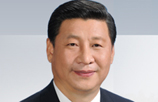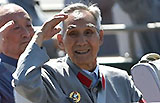China-Russia-US relations probed deeply, as well they should
By Chen Weihua in Washington (China Daily USA) Updated: 2015-07-27 04:03There has been plenty of finger pointing from US officials and lawmakers at China and Russia, with US President Barack Obama saying it should be the US, not China, that writes global trade rules, and the latest being Gen Joseph Dunford, Obama’s nominee for chairman of the Joint Chiefs of Staff, naming Russia and China the top two threats to the US national security.
While such rhetoric from the US is nothing new, scholars and researchers are trying to dig deep into what has caused such American behavior in comparison with China and Russia.
The Kennan Institute and the Kissinger Institute on China and the United States kicked off a series of talks last Thursday by first examining the national identities of China and Russia.

Matthew Rojansky, director of the Kennan Institute, said the talk was to help American audiences and audiences in Washington who, when talking about Russia, often begin with what Americans want, hope for and expect. “It’s inherently framed in an American world view,” he said.
Robert Daly, director of the Kissinger Institute, said it’s the wrong first question to begin talking with — what we want them to do.
“The first question is why they behave the way they do and what they believe and how they see themselves,” he told China Daily after the talk.
Daly, once a US Foreign Service officer, believes such an approach will help the US handle its diplomacy with both countries in a more effective way.
Nikolai Zblobin, president of the Washington-based Center for Global Interests, said it is wrong for Americans to interpret Russia in terms of the character of its national leader, as in Putin’s Russia or Yeltsin’s Russia, referring to Russian President Vladimir Putin and his predecessor Boris Yeltsin.
“In my mind, instead of Putin’s Russia, it’s very much Russia’s Putin,” he said.
Zblobin said Russians do not see themselves as a nation, but a civilization, so the West’s actions would always be seen as “the West does not respect us.”
The first seminar on Thursday was the beginning of a series of talks which will include the US later. There have been many talks and articles lately about how global geopolitics will shift in light of the new dynamics between China, Russia and the US over the past few years.
While many observers want to see if there will be a China-Russia alliance, Daly and Rojansky argued in a recent article that the US should engage China and Russia with issues, not scolding.
Why, for example, do so many Western scholars and policymakers emphasize the historical enmity and disparate interests between China and Russia and conclude that a Sino-Russian partnership must be illusory?
The two believe such dismissals overlook cultural commonalities that draw proud Russians and Chinese closer together, particularly in the face of the dismissive attitudes from Washington.
A Pew Center Global Attitudes and Trends survey released in June found Russians view China much more favorably (79 percent) than Americans (38 percent) view China, while the unfavorable rate is low (14 percent) compared with Americans’ 54 percent.
“Both nations are continental powers with ancient, deeply mythologized histories. Both pride themselves on ‘unique’ national virtues,” they wrote. “Beijing and Moscow both seek legitimacy in the claim that they defend these virtues from foreign powers that have humiliated them in the past and seek to undermine them now.”
They went on to say that to fathom China’s present anger over defeats and insults suffered during and since the Opium War of the mid 1800s, Americans need only think of the passions still elicited in the US south when the Civil War comes up.
The authors also pointed to the US’ insensitivity and contradictory remarks on China, such as US President Barack Obama in 2014 calling China “free riders for the last 30 years.”
“When China tries to build institutions or provide public goods, it is told that its standards fall short of America’s,” they noted.
On the White House’s clumsy stance against the Asia Infrastructure Investment Bank in the beginning, the two authors said China sees the same denigrating tendency by Washington.
“Because the Chinese and Russian people are long-sensitized to America’s sense of superiority, these countries regard the slightest tincture of American contempt as an assault on national dignity,” they wrote.
They argue that US analysis should integrate cultural and historical factors into policymaking and should strive to understand China and Russia on their own terms, even if those terms seem offensive or wrong.
“When Washington needs to deliver tough messages to Beijing and Moscow, it should employ quiet, sustained diplomacy and focus on technical rather than civilizational issues,” they wrote.
Contact the writer at chenweihua@chinadailyusa.com





